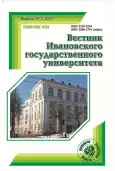Berlin in Existential Reflection (Based on the Novel “The House of Paraffin” by Anahit Sagoyan)
- Autores: Syryseva D.Y.1
-
Afiliações:
- A.M. Gorky Institute of World Literature of the Russian Academy of Sciences
- Edição: Nº 1 (2025)
- Páginas: 27-33
- Seção: Philology. Literary criticism
- URL: https://journal-vniispk.ru/2219-5254/article/view/310952
- DOI: https://doi.org/10.46726/H.2025.1.4
- ID: 310952
Citar
Texto integral
Resumo
The article is devoted to the consideration of the Berlin’s image shown in the novel “House of Paraffin” by the modern Russian-speaking writer Anahit Sagoyan through the prism of existential reflection. The existential principle, manifested in the novel both at the level of macropoetics (complication of composition) and at the level of micropoetics (motives of emptiness, loneliness, dying, fear; imagery that actualizes this aesthetics), sets a special optics for the perception of Berlin. The representation of urban space is extremely subjectivied (the characters not only think about the city, but also live in it); the urban space is also set by making use of the techniques of cinema and photography (the hero’s gaze as a camera angle; associative montage; close-up, general plans). An attempt is made to introduce into scientific research the work of a writer who, on the one hand, organically continues the traditions of Russian emigrant writers (V. Nabokov) and appeals to their experience of knowing and describing a foreign city, on the other hand, actualizes a special code for reading the surrounding reality (“Berlin text”). Conclusions are drawn that Berlin in the novel not only becomes one of the main locations of action, but also conveys a special aesthetics and also becomes mythogenic.
Palavras-chave
Sobre autores
D. Syryseva
A.M. Gorky Institute of World Literature of the Russian Academy of Sciences
Autor responsável pela correspondência
Email: syryseva97@mail.ru
Candidate of Sciences (Philology), junior research Moscow, Russian Federation
Bibliografia
- Dronova O.A. Mythologem “Berlin — Babylon” and the Berlin text of the modern German novel, Dialogue with antiquity in an interdisciplinary con-text, Nizhny Novgorod, 2023, pp. 70—80. — In Russ.
- Ishimbaeva G.G. Berlin in the Noir Style: Volker Kutscher and Erik Larsen, Russian German Studies: Yearbook of the Russian Union of Ger-manists, vol. 16: Active Processes in Language and Literature: Sociocul-tural Foundations, Nizhny Novgorod, 2019,
- pp. 166—174. — In Russ.
- Morev D.A. Berlin as a text in the meta-novel of V.V. Nabokov and E.M. Remarque: abstract of the dis. … candidate of sciences (Philology), Mos-cow, 2008, 19 p. — In Russ.
- Ponomarev E.R. “Berlin essay” of the 1920`s as a variant of the St. Pe-tersburg text, Problems of literature, 2013, no. 3, pp. 42—67. — In Russ.
- Semenova S.G. Russian poetry and prose of the 1920`s—1930`s. Poetics—Vision of the world—Philosophy, Moscow, 2001, 590 p. — In Russ.
- Uzbekova G.F. “Someone else’s word” and the symbolism of keys in Rus-sian-language novels by V. Nabokov, Vestnik VSU. Series: Philology. Journalism, 2016, no. 3, pp. 90—93. — In Russ.
- Uillis O. The urban landscape of V. Nabokov and the “Berlin text” of German literature and art, Bulletin of RUDN. Series “Literary criticism, Journalism”, 2008, no. 3, pp. 31— 36. — In Russ.
- Shastina E.M. “The Berlin Text” by V.V. Nabokov and E. Canetti, Philo-logical sciences. Theoretical and practical issues, 2015, no. 6 (48): in 2 pts., pt. I, pp. 206—209. — In Russ.
Arquivos suplementares









